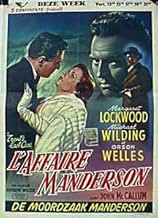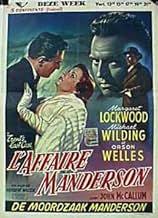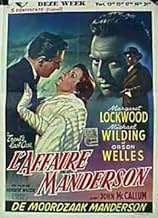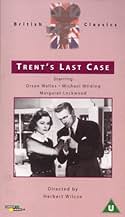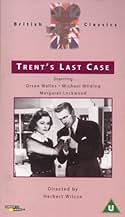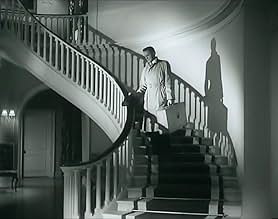IMDb RATING
6.0/10
642
YOUR RATING
A reporter investigates a rich businessman's death. While police rule it suicide, Trent believes it's murder and grows intrigued by the widow and secretary.A reporter investigates a rich businessman's death. While police rule it suicide, Trent believes it's murder and grows intrigued by the widow and secretary.A reporter investigates a rich businessman's death. While police rule it suicide, Trent believes it's murder and grows intrigued by the widow and secretary.
- Director
- Writers
- Stars
Geoffrey Bayldon
- Reporter in Court
- (uncredited)
Ernest Blyth
- Concert Attendee
- (uncredited)
Robert Cawdron
- Police Constable
- (uncredited)
John Chandos
- Tim O'Reilly
- (uncredited)
Anthony Collins
- Conductor
- (uncredited)
Henry Edwards
- Coroner
- (uncredited)
Eileen Joyce
- Pianist
- (uncredited)
Ben Williams
- Jimmy - Reporter
- (uncredited)
Kenneth Williams
- Horace Evans
- (uncredited)
- Director
- Writers
- All cast & crew
- Production, box office & more at IMDbPro
Featured reviews
This viewer is not exactly a devotee of the films of Herbert Wilcox but this one is not at all bad. E. C. Bentley had intended his novel to be a parody and although Wilcox has chosen to play it straight one cannot actually take it too seriously. This director's notable lack of flamboyance happens to suit this rather innocuous, teddibly civilised period piece very well.
It is presented by Republic Pictures for whom Orson Welles had made his bizarre 'Macbeth.' One is intrigued by his third billing and eagerly awaits his appearance. It is certainly worth the wait as his Mephistophelian presence and basso profundo are absolutely magnetic. It seems as if we are suddenly in an entirely different film and one is hardly surprised to learn that Welles wrote and directed his own scenes!
As for the rest of the film we have the debonair Michael Wilding, certainly no stranger to Wilcox, who is well cast as Bentley's engaging amateur sleuth of the title. Playing the widow of the millionaire who is assumed to have committed suicide, although Trent suspects foul play, is Margaret Lockwood. It is far more difficult to play 'good' than 'bad' and Miss Lockwood is more effective when playing the latter. The same comment would also apply to John McCallum as the prime suspect. The delightful Miles Malleson is, well.....Miles Malleson!
There is splendid use made of the Larghetto from Mozart's C minor piano concerto which suits the melancholy mood of the film.
By far the best scene(surprise, surprise) is one directed and wonderfully lit by Welles in which he and John McCallum discuss Shakespeare's depiction of a husband's jealousy in 'Othello'. Welles remarks that he had recently seen this play performed at St. James's Theatre and was none too keen on the leading actor. He is of course referring to, yes, you've guessed it........ himself!
It is presented by Republic Pictures for whom Orson Welles had made his bizarre 'Macbeth.' One is intrigued by his third billing and eagerly awaits his appearance. It is certainly worth the wait as his Mephistophelian presence and basso profundo are absolutely magnetic. It seems as if we are suddenly in an entirely different film and one is hardly surprised to learn that Welles wrote and directed his own scenes!
As for the rest of the film we have the debonair Michael Wilding, certainly no stranger to Wilcox, who is well cast as Bentley's engaging amateur sleuth of the title. Playing the widow of the millionaire who is assumed to have committed suicide, although Trent suspects foul play, is Margaret Lockwood. It is far more difficult to play 'good' than 'bad' and Miss Lockwood is more effective when playing the latter. The same comment would also apply to John McCallum as the prime suspect. The delightful Miles Malleson is, well.....Miles Malleson!
There is splendid use made of the Larghetto from Mozart's C minor piano concerto which suits the melancholy mood of the film.
By far the best scene(surprise, surprise) is one directed and wonderfully lit by Welles in which he and John McCallum discuss Shakespeare's depiction of a husband's jealousy in 'Othello'. Welles remarks that he had recently seen this play performed at St. James's Theatre and was none too keen on the leading actor. He is of course referring to, yes, you've guessed it........ himself!
It's good news for Welles completists that this, the better of the two films he made for Herbert Wilcox in 1952 (to help finance his on-off-on but finally magnificent film of 'Othello') is now available on DVD, though dismally free of extras. As a thriller it is a puzzle almost devoid of suspense, though there are some clever twists at the end. There are polished performances by Margaret Lockwood, John McCallum, Michael Wilding as the classy sleuth Trent, Miles Malleson in one of his best roles and Welles. Welles appears for no more than 20 minutes, in flashback, but, with his formidable false nose, is an intimidating presence as the late Sigsbee Manderson. In a fraught dialogue with McCallum he talks about 'Othello' and the production he's recently seen: "Didn't like the leading actor!" The leading actor was Welles himself, performing at the St James' theatre - a performance I was privileged have seen a year or two earlier, when Ken Tynan, long before PC was thought of, headed his review 'Citizen Coon'!
Michael Wilding takes up "Trent's Last Case" in this 1952 film directed by Herbert Wilcox for Republic Studios. It's British with a British cast that includes Margaret Lockwood, John McCallum, Hugh McDermott, and one American, Orson Welles, who was probably trying to raise money for a project.
Trent is an artist and also an amateur detective. He gets involved in the suicide of a wealthy man named Manderson, but as he investigates, it looks more and more like murder. One suspect stands out, but how to prove it?
Unlike many detectives in books and movies, Trent is fallible. This is a neat mystery with a few red herrings. I don't agree that it was dull; I think the story itself keeps the film going, as well as the attractive Michael Wilding. Wilding falls in with many of those tall, good-looking British actors from the '50s - Robert Flemying, Michael Rennie, etc., and probably wouldn't be well known here if he hadn't married Elizabeth Taylor. Nevertheless, he was quite urbane with a great voice and acquits himself well as Trent. Margaret Lockwood is lovely as the victim's widow, and she keeps you guessing.
Not as bad as some reviewers claim. Maybe not as good either, but I enjoyed it. Orson Welles apparently had an obsession with using fake noses on his characters. It's really obvious in profile.
Trent is an artist and also an amateur detective. He gets involved in the suicide of a wealthy man named Manderson, but as he investigates, it looks more and more like murder. One suspect stands out, but how to prove it?
Unlike many detectives in books and movies, Trent is fallible. This is a neat mystery with a few red herrings. I don't agree that it was dull; I think the story itself keeps the film going, as well as the attractive Michael Wilding. Wilding falls in with many of those tall, good-looking British actors from the '50s - Robert Flemying, Michael Rennie, etc., and probably wouldn't be well known here if he hadn't married Elizabeth Taylor. Nevertheless, he was quite urbane with a great voice and acquits himself well as Trent. Margaret Lockwood is lovely as the victim's widow, and she keeps you guessing.
Not as bad as some reviewers claim. Maybe not as good either, but I enjoyed it. Orson Welles apparently had an obsession with using fake noses on his characters. It's really obvious in profile.
MICHAEL WILDING is an armchair detective who sets out to determine whether or not the death of ORSON WELLES was suicide or murder. He thinks he's solved the case, only to learn that all is not what it appears (without giving the outcome away).
Unfortunately, the script is a dreary, talky and ponderous, making the film appear to be an amateurish stage play, although based on a novel. It's static. Nothing at all cinematic about the approach, nor is there any imagination in the directing.
Of all the players, MARGARET LOCKWOOD as the beautiful wife of the deceased man and JOHN McCALLUM as the man's secretary have key roles that they play with assurance. ORSON WELLES, with fake nose and bushy brows, might as well have been from another film. His ten or fifteen minutes of time on screen renders nothing but ham. Director Herbert Wilcox was evidently unable to tone him down and as a result his key scenes throw the film off stride. MICHAEL WILDING has a colorless role as the newspaper reporter who suspects foul play but can't prove anything.
With a talky script and lack of any cinematic touches, TRENT'S LAST CASE goes nowhere fast and leaves the viewer expecting a strong twist that never arrives--instead, a flat ending.
Production values are fine even though the film comes from the usually low-budget Republic studios.
Unfortunately, the script is a dreary, talky and ponderous, making the film appear to be an amateurish stage play, although based on a novel. It's static. Nothing at all cinematic about the approach, nor is there any imagination in the directing.
Of all the players, MARGARET LOCKWOOD as the beautiful wife of the deceased man and JOHN McCALLUM as the man's secretary have key roles that they play with assurance. ORSON WELLES, with fake nose and bushy brows, might as well have been from another film. His ten or fifteen minutes of time on screen renders nothing but ham. Director Herbert Wilcox was evidently unable to tone him down and as a result his key scenes throw the film off stride. MICHAEL WILDING has a colorless role as the newspaper reporter who suspects foul play but can't prove anything.
With a talky script and lack of any cinematic touches, TRENT'S LAST CASE goes nowhere fast and leaves the viewer expecting a strong twist that never arrives--instead, a flat ending.
Production values are fine even though the film comes from the usually low-budget Republic studios.
This is pure whodunit,in the grand tradition of Agatha Christie and there are similarities with the lady of crime's "murder on the links" ,but the solution is not as brilliant as hers ,because in this field,she has no equal.
Anyway ,everyone who likes Christie will relish .A desirable mansion ,where a man took his own life (or was it murder?) and suspects including two secretaries,one of whom may be in love with the dead's wife and the other one may be jealous.But the main asset of the movie is the wealthy (suicidal?) businessman ,masterfully portrayed by Orson Welles whom we only see in flashbacks :the scene when we hear his formidable voice ,but only the back of his armchair gives the jitters. Michael Wilding has no gray cells,but he displays flair for clues ,as though he had be trained by Hercule Poirot.Entertaining whodunit.
Anyway ,everyone who likes Christie will relish .A desirable mansion ,where a man took his own life (or was it murder?) and suspects including two secretaries,one of whom may be in love with the dead's wife and the other one may be jealous.But the main asset of the movie is the wealthy (suicidal?) businessman ,masterfully portrayed by Orson Welles whom we only see in flashbacks :the scene when we hear his formidable voice ,but only the back of his armchair gives the jitters. Michael Wilding has no gray cells,but he displays flair for clues ,as though he had be trained by Hercule Poirot.Entertaining whodunit.
Did you know
- TriviaIn the film, Sigsbee Manderson (played by Orson Welles) mentions a performance of Shakespeare's "Othello" at the St. James Theatre in London in 1951, in which he disliked the leading actor's performance. This is an in-joke: Welles himself played Othello at the St. James in 1951, under his own direction. Peter Finch played Iago opposite him.
- GoofsDuring the coroners inquest, Trent was seen drawing a sketch of Marlowe. This is not allowed in English Courts. Although court artists are allowed in as members of the public, all drawings must be done by memory outside the courtroom.
- Quotes
Margaret Manderson: He talks of reopening the case.
John Marlowe: You should've ordered him out of the house.
Margaret Manderson: And confirm his suspicions?
- SoundtracksPiano Concerto in C Minor
Music by Wolfgang Amadeus Mozart (as Mozart)
Arranged and Conducted by Anthony Collins (uncredited)
Performed by Eileen Joyce
Details
- Release date
- Country of origin
- Language
- Also known as
- Trent's Last Case
- Production company
- See more company credits at IMDbPro
- Runtime
- 1h 30m(90 min)
- Color
- Aspect ratio
- 1.37 : 1
Contribute to this page
Suggest an edit or add missing content

